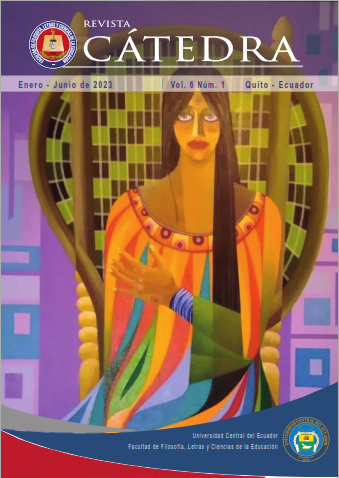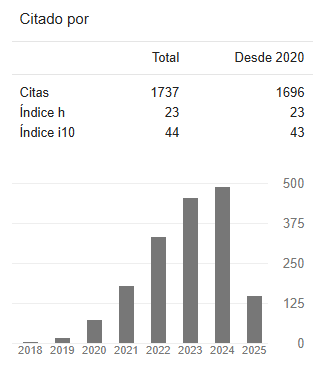Vocational and professional guidance as an alternative in the choice of university careers
DOI:
https://doi.org/10.29166/catedra.v6i1.4109Keywords:
Student, evaluation, career guidance, social participationAbstract
Vocational and professional orientation processes should allow high school students to select a university career oriented to their life project. However, many students drop out in the first semesters of college due to various factors (economic, emotional, psycho-pedagogical, among others). Among these is also the lack of professional orientation and the construction of vocational and professional tasks that consolidate this career choice. The objective of this research work was to determine the influence of the professional orientation process on the choice of university careers in third year high school students. The approach used was quantitative of an explanatory and correlational type supported by a qualitative analysis process of an interpretative hermeneutic type. The study population was selected through a purposive sampling and consisted of 342 students in the third year of high school from various public and private educational institutions in Ecuador. A battery of tests of professional aptitudes and interests and a structured interview were used as research instruments. The results of the statistical study carried out have made it possible to identify the influence of professional orientation on the choice of a university career in the study population. It is therefore concluded that this process could help students in this context to choose a career aligned with their life project and aptitudinal potential.
Downloads
References
Andrade, J., Tapia, P., y Chávez, F. (2017). Orientación vocacional y personalidad en el Sistema Nacional de Nivelación y Admisión en la Universidad Técnica de Ambato. Ecos de la Academia, 3(5), 26-39.
Briones, Y., y Triviño, J. (2018). Trends and challenges in higher education in Latin America - Factores que intervienen para elegir carreras universitarias. Universidad Técnica de Manabí. (J. C. Tovar-Gálvez, Ed.) Eindhoven, Netherlands: Adaya Press. Obtenido de file:///C:/Users/xavie/Downloads/Dialnet-TrendsAndChallengesInHigherEducationInLatinAmerica-735673.pdf
Cancino, P. (2018). La orientación profesional desde la Universidad Laica Eloy Alfaro de Manabí: una brecha social en la relación universidad-sociedad. Open Journal Systems en: Revista de entrenamiento, 1(3), 115-128.
De la Herrán Gascón, A., Cedeño, A., y Lara, F. (2018). Claves del cambio educativo en Ecuador. Foro de Educación, 16(24), 141-166.
Erazo, X., y Rosero, E. (2021). Orientación vocacional y su influencia en la deserción universitaria. Horizontes Revista de Investigación en Ciencias de la Educación, 5(18), 591-603.
Figueroa, F., Vergara, G., Pico, G., Soledispa, E., y Briones, M. (2021). La psicopedagogía y su influencia en la orientación vocacional de los estudiantes. Dominio de las Ciencias, 7(1), 850-868.
García, O., Lorenzo, E., y Del Pino, J. (2020). Estrategia con enfoque multifactorial para la orientación profesional pedagógica. Revista Electrónica Formación y Calidad Educativa, 7(3), 45-59.
Hernández-Sampieri, R., Fernández-Collado, C., y Baptista-Lucio, P. (2018). Metodología de la investigación: Las rutas cuantitativa, cualitativa y mixta. México: Mc Graw Hill.
Lucero, E., Pin, L., y Hernández, M. (2020). Características vocacionales y comportamiento social de la Generación Z. Caso El Triunfo, Ecuador. Maskana, 11(1), 26-32.
Mejía, D., Cueva, A., Diaz, S., y Cuenca, S. (2018). Orientación vocacional y elección de la carrera profesional en la Universidad Nacional de Loja. Revista UNIANDES Episteme, 5(4), 372-387.
Mejía, P. (2019). Educación: Orientación Vocacional y Profesional, garantía de derechos y construcción de proyectos de vida. Revista Ciencia UNEMI, 12(30), 87-102.
Ocampo, J., Pulupa, J., y Knezevich, A. (2017). Beneficios y limitaciones del empleo de TIC en la orientación vocacional de estudiantes de educación secundaria de Guayaquil, Ecuador. Maskana, 8(1), 333-342.
Quishpe, J. (2022). Diseño de un instrumento de orientación vocacional para estudiantes de educación tecnológica. Polo del Conocimiento, 7(6), 1169-1186.
Ramírez, R., Manosalvas, M., y Cárdenas, O. (2019). Estereotipos de género y su impacto en la educación de la mujer en Latinoamérica y el Ecuador. Revista Espacios, 40(41), 29-36.
Rodríguez, W. (2020). Importancia de la orientación profesiográfica en los bachilleres que desean estudiar una carrera en la Universidad de Guayaquil a partir del año 2020, en el Ecuador. Revista Ciencias Pedagógicas e Innovación, 8(2), 47-56.
Santana, G., y Vigueras, J. (2019). Hacia un Sistema Virtual de orientación vocacional. Revista Cubana de Educación Superior, 38(3), 1-15.
Verdesoto, G., Mora, K., y Torres, L. (2018). Análisis de la deserción estudiantil en las universidades del Ecuador y América Latina. Pertinencia Académica, 8(1), 1-28.
Viteri, C. (2018). Pluralidad de causas en la demanda por una carrera universitaria, estudio de la zona 3–Ecuador. Revista Educación, 42(2), 356-378. doi:https://doi.org/10.15517/revedu.v42i2.27263
Yépez-Herrera, E., Rivera-Heredia, M., Valadez-Sierra, M., Pérez-Daniel, M., y González, F. (2019). Hacia una comprensión de la reprobación universitaria en las carreras de ingeniería de Ecuador y México. Revista Educación y Desarrollo, 48(1), 41-52.









